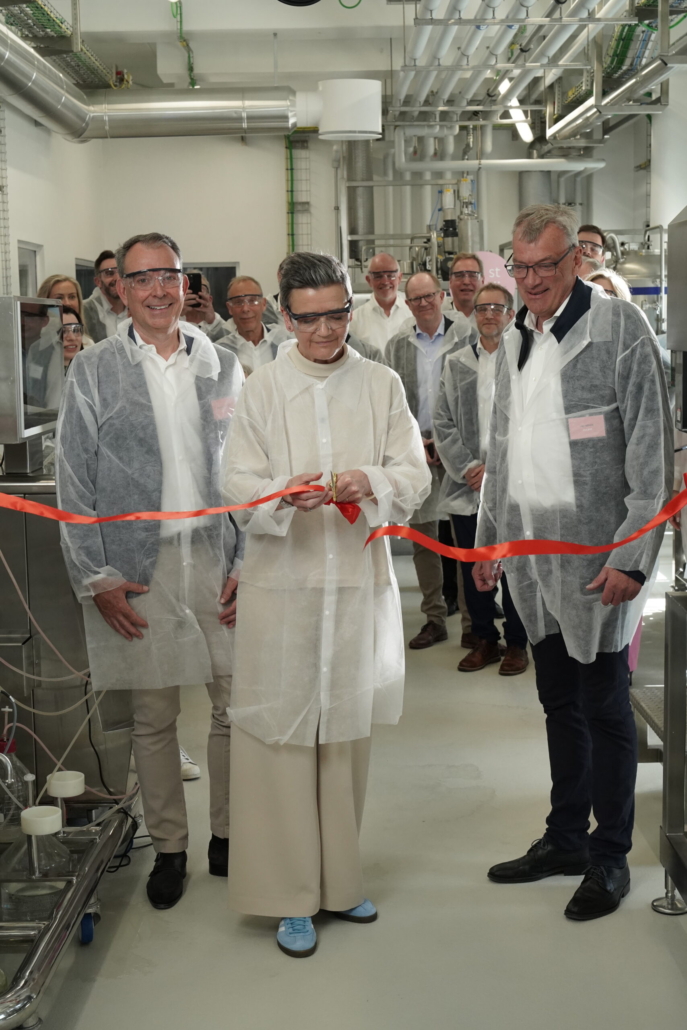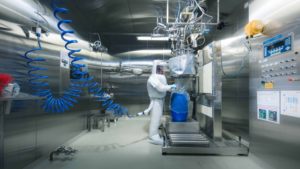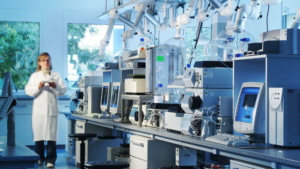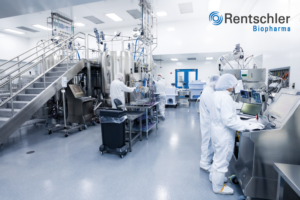
Danish 21st.BIO A/S opens multipurpose production plant
Danish CDMO 21st.BIO A/S has unveiled a new pilot plant facility to accelerate scaling of biotech processes ranging from food and beverages, agriculture, biomaterials, and biopharma.
Today, EU Executive Vice-President Margrete Vestager launched a multi-purpose pilot production facility in Copenhagen, with which 21st.BIO A/S aims to bridge the gap between laboratory scale and industrial production of novel food and pharmaceutical proteins and peptides.
#According to 21st.BIO, the new facility will help biotech companies to reach industrial scale faster, with less risk and more cost-effectively. Vestager and a hundred other guests from the financial sector, politics and the bioindustry attended the inauguration of the new facility. 21st.BIO provides contract services worldwide, ranging from strain design to upscaling industrial production.
‘In this industry, upscaling mistakes cost a lot of money and time,’ said Thomas Schmidt, co-founder and managing director of 21st.BIO. ‘For our customers, it’s all about getting the next step right. The ability to increase productivity while scaling up makes the difference between good and great.’
The processes carried out in the 3,000-litre pilot plant can help to define the parameters and equipment required for the large-scale production of proteins by fermentation. Although the plant is currently only producing on a pilot scale, it is designed for industrial production, according to 21st.BIO. The pilot plant aims to increase the production of recombinant proteins and peptides for applications in nutrition, food and beverage, agriculture, biomaterials and biopharma.
Home to pioneers in precision fermentation such as Novo Nordisk and Novonesis, Denmark is recognised as a leader in bioproduction. According to a recent McKinsey report, it is estimated that 60% of inputs to the global economy could be produced organically over time. For this reason, many countries, particularly in the Asia-Pacific region, are investing heavily in bioproduction technology to produce high-quality food and biomaterials locally.
21st.BIO A/S claimed that Europe has the opportunity to contribute its leading technology and expertise for the benefit of the world. However, experts told European Biotechnology that this was PR. Nevertheless, the opening of 21st.BIO began with an exclusive roundtable discussion, where twenty high-ranking participants from politics, finance and industry discussed the leading role of EU countries in the industrial scaling of bioproduction over lunch.
Danish EU politician Vestager underlined the great potential of the biotech sector in tackling key challenges ranging from ensuring sustainability to stabilising global food chains. She emphasised Europe’s leading role in science, but at the same time acknowledged that bringing science to market is hampered by insufficient funding, lengthy EU regulatory procedures [pointing to non-competitive timescales at the EU’s compentent authority EFSA] and a reduced talent pool due to the brain drain to more attractive locations at global scale. She called for co-operation between policy makers and industry stakeholders to ensure that industry experience is taken into account when shaping policy.
In March, Vestager had presented a non-binding Commission paper on ‘Biotechnology and Biomanufacturing’ and announced a series of measures that could help the sector to flourish in the future if implemented quickly. These include simplification of the regulatory framework and faster market access, better support for scale-up, fewer subsidies for fossil-based products and encouraging more investment in biotechnologies and bio-manufacturing in the coming years.
However, the EU Commission’s plan to boost funding along the lines of China and the USA failed due to a lack of support from EU member states in the mid-term financial plannings of the EU to provide more money for a new instrument called STEP, for which EUR 160 billion was originally earmarked. In its current form, several existing funds will be redistributed and will then be available under STEP. However, Vestager dreamed of a Europe that is not only the cradle for new solutions such as cell-based meat. ‘What is born here should also grow up and stay here,’ she told the press.


 Lonza Group
Lonza Group Vetter Pharma
Vetter Pharma Rentschler Biopharma SE
Rentschler Biopharma SE